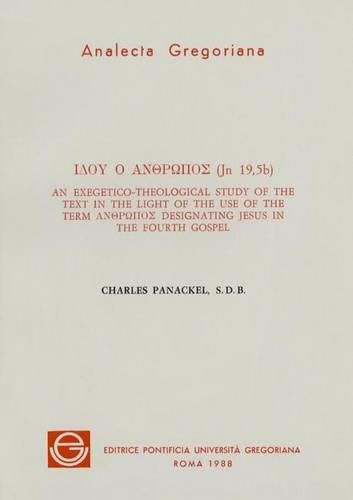Readings Newsletter
Become a Readings Member to make your shopping experience even easier.
Sign in or sign up for free!
You’re not far away from qualifying for FREE standard shipping within Australia
You’ve qualified for FREE standard shipping within Australia
The cart is loading…






In today’s world, that has seen the birth of a new humanism (Vat. II, GS, 55), the focus of interest in Christology has understandably shifted from the divinity of Jesus to his humanity, with the recognition that it is the humanity of the man called Jesus of Nazareth that is the locus of God’s revelation and the means of reconciliation of the world to himself. Such an approach in Christology, without in any way ignoring, diminishing or denying Jesus’ divinity, is given a vibrant expression in Charles Panackel’s book: Indou ho anthropos (Jn 19,5b). Through the lucid presentation of his research, that is analytico-synthetic and exegetico-theological, the author seeks to unravel and highlight the double entente in Jn 19,5b, arriving at the primary meaning principally in the light of Pilate’s character as seen in the Trial Scene, and at its ulterior meaning in the light of all the Jesus - occurrences spread across ten Chapers in the Fouth Gospel, thereby adopting an approach that is totally original and offering insights that are refreshingly new. The present study is a significant contribution to Johannine scholarship for the Jesus - theme climaxing in Jn 19,5b, that it highlights, and for the lively discussion that it is bound to evoke.
$9.00 standard shipping within Australia
FREE standard shipping within Australia for orders over $100.00
Express & International shipping calculated at checkout
In today’s world, that has seen the birth of a new humanism (Vat. II, GS, 55), the focus of interest in Christology has understandably shifted from the divinity of Jesus to his humanity, with the recognition that it is the humanity of the man called Jesus of Nazareth that is the locus of God’s revelation and the means of reconciliation of the world to himself. Such an approach in Christology, without in any way ignoring, diminishing or denying Jesus’ divinity, is given a vibrant expression in Charles Panackel’s book: Indou ho anthropos (Jn 19,5b). Through the lucid presentation of his research, that is analytico-synthetic and exegetico-theological, the author seeks to unravel and highlight the double entente in Jn 19,5b, arriving at the primary meaning principally in the light of Pilate’s character as seen in the Trial Scene, and at its ulterior meaning in the light of all the Jesus - occurrences spread across ten Chapers in the Fouth Gospel, thereby adopting an approach that is totally original and offering insights that are refreshingly new. The present study is a significant contribution to Johannine scholarship for the Jesus - theme climaxing in Jn 19,5b, that it highlights, and for the lively discussion that it is bound to evoke.